Political Activities, Travels to USSR and USA
by Sachi Sri Kantha, July 2, 2021
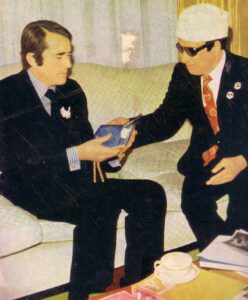
MGR with actor Gregory Peck in 1974
Fellow MGR biographer R. Kannan’s expert comments on the previous chapter Part 60, received by email of Mar 29, 2021, are as follows:
“ I read your well-researched article with interest. MGR had much respect for Kamaraj and Kamaraj had defended MGR’s philanthropy at the 1962 Indo-Sino war. MGR’s praise for Kamaraj in 1965 as ‘my leader’ could have been partly from this regard and partly probably because he was cut up with the DMK at that point for some reason. Kamaraj was alarmed by MGR’s emergence and naturally. He was the first to understand that MGR would turn the fight in TN henceforth to between the Dravidian parties. His fears came true. On Dindigul [by-election of 1973], Karunanidhi has spoken much and had also written pithily.
Kalaignar attributed the ADMK’s success to ‘film glamour’ that was merely localized, not a reflection of the entire state. On 22 May Viduthalai said that the Dindigul result was ‘unexpected and the reason for it [was] difficult to comprehend. On 25 May, MGR issued a lengthy statement that demolished the claim that he was not a Tamil, and that it was cine glamour that had dazzled the voters and won him the election.
‘Kalaignar recorded Dindigul as a ‘great defeat in the DMK’s history’ and a speed breaker for all the future victories.198 The mood in the DMK camp was sullen. Theekadhir published this trivia: ‘Yesterday (21 May 1973) when the votes were being counted, DMK MP Murasoli Maran came out. A newsman had reportedly asked him about the trends. He had reportedly responded irritably, “In the next elections Jayalalithaa will win.’
Little could Maran have known then that his words would come true in less than two decades in 1991.”
Kannan’s reply was well taken. My response, sent on Mar 30, 2021 was as follows:
“Thanks a lot for your prompt response. Your points are well taken. No qualms about it. As per Kalaignar’s thoughts on Dindigul by election of 1973, what I stated was that he didn’t include any mention about it, in his autobiography Nenjuku Neethi. That’s all. What he personally felt about it.
I want to know the details, about the photo which I had included [in part 60]. I picked it from internet. An unusual one, with Kamaraj, Kalaignar and MGR. MGR is with his white cap, but devoid of his dark glass. I think, the guy on the right of Kamaraj may be C. Subramaniam. But, I cannot guess who the other guy, (seated to Subramaniam’s right) was? Do you recognize? What was the occasion in which they were gathered? Could it be Anna’s funeral?”
To my query, Kannan responded promptly that my guess on the specific occasion that particular photo was taken was correct indeed.
Revisiting the ‘Ramchandar’ name variant issue
When I started this series in December 2012, I had mentioned that “In the early movies MGR acted as a hero, he was billed as M.G. Ramchandar.” [MGR Remembered, Part 1]. Then, again I noted, in Aug. 24, 2014, “It was only in ‘Andaman Kaithi’, that the moniker M. G. Ramachandran came to be used in the title credit. Until then, he had preferred the name M.G. Ramachandar.” [MGR Remembered – Part 20]. It’s time to revisit this ‘Ramchandar’ mystery once more in 2021, with new empirical evidence gained from viewing MGR’s old movies (between 1939 and 1952), now available in Youtube. When I wrote Part 1 to Part 20, I couldn’t confirm positively, the interpretation offered by Tamil film historians, including Randor Guy. Thanks to Youtube postings, I tabulated the following details of title credits used for MGR – Ramachandran or Ramchandar. Here is the empirical evidence.
Prahlada (1939), Salem Sankar Films – M.G. Ramachandran
Ashok K umar (1941), Murugan Talkies – M.G. Ramchandar
Harichandra (1944), Sri Rajeswari Film Co – M.G. Ramachandran
Meera (1945), ChandraPrabha Cinetone – M.G. Ramachandran
Rajakumari (1947), Jupiter Pictures – M.G. Ramchandar
Abhimanyu (1948), Jupiter Pictures – M.G. Ramchandar
Mohini (1948), Jupiter Pictures – M.G. Ramchandar
Ratnakumar (1949), Murugan Pictures – M.G. Ramachandran
Maruthanattu Ilavarasi (1950), G. Govindan & Co – M.G. Ramchandar
Mandiri Kumari (1950), Modern Theatres – M.G. Ramchandar
Marma Yogi (1951), Jupiter Pictures – M.G. Ramchandar
Sarvadhikari (1951), Modern Theatres – M.G. Ramchandar
En Thangai (1952), Asoka Pictures – M.G. Ramachandran
Among the 13 movies, while Ramchandar was used 8 times, Ramachandran had been used 5 times, especially when MGR appeared in minor roles of early movies Prahlada, Harichandra and Meera. It should also be noted, that 4 of the 13 movies were produced by Jupiter Pictures and 2 were produced by Modern Theatres. Both these productions houses were owned by strong willed businessmen producers M. Somasundaram from Tirupur and T.R. Sundaram (1907-1963) from Salem respectively; and Ramchandar name was used in six of their movies. They held the ultimate veto with all details. It should not be forgotten that when a young Karunanidhi had the guts to question why his name was excluded from the title credits for script writing to the ‘Abhimanyu’ movie released on May 6, 1948, the curt response of Jupiter’s boss Somasundaram was ‘Will you wait for a while? I’ll include your name, once you receive recognition [for your efforts]’. In this movie, MGR played the secondary role of Mahabharata’s hero Arjunan, but the titular role Abhimanyu (son of Arjuna) was given to S.M. Kumaresan.
As such, it is plausible to infer that considering the power imbalance he faced in those days, being a young fledgling hero MGR could not have over ruled the wishes of his two bosses who had taken the trouble to promote his career. And these bosses, with their peculiar superstitions and ‘good omens’ in making their box office tills ring would have opted to use the name M.G. Ramchandar, at least for the sake of continuity.
In his published biography on Karunanidhi, which I had recently reviewed in this website [https://sangam.org/book-review-karunanidhi-a-life-by-a-s-panneerselvan/]
Panneerselvan had asserted that “MGR even changed the spelling of his name to suite the spirit of the times. He was called M.G. Ramchander, to have a pan-Indian ring to his name when the nationalist movement had popular approval, and he changed his name to a more common Tamil nomenclature, M.G. Ramachandran, when he moved back to the DMK.”and had cited Kannan’s biography as the source. Above presented empirical data and the powerlessness of MGR’s wish against that of movie producers reveals the falsity of Panneerselvan’s interpretation.
Political Number game at the Tamil Nadu State Assembly
After the 1971 General elections, the party positions at the Tamil Nadu Legislative Assembly were as follows;
DMK – 182, Congress (Old/Organization) – 15, Communist Party of India (CPI) – 8, Forward Bloc – 6, Muslim League – 6, Swatantra Party – 6, Praja Socialist Party – 4, Tamil Arasu Kazhagam – 1, Independents – 4.
Due to a lopsided alliance agreement Indira Gandhi agreed with Karunanidhi, her Congress Party did not have representation at the Tamil Nadu assembly. But, post- election realities and logistics came into play. Either Indira Gandhi or her representatives at the state level needed ‘few hands’ to represent them at the legislative assembly. Four members who were elected under the Praja Socialist Party were roped in to change their affiliations to Congress Party (Indira-leaning) and two more elected under the Congress (Old- representing Kamaraj clique)label, were also induced to join the Congress Party led by Indira. Praja Socialist Party (founded in 1952) and led by Jayaprakash Narayan failed to make any electoral impact in Tamil Nadu, due to lack of active leaders at the local level.
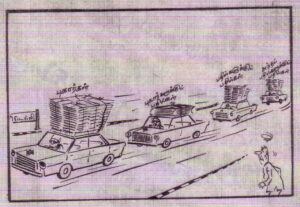
Mathan cartoon – MGR submitting corruption complaint to Delhi, 1973
As a result of this sort of ‘horse-trading’, the party positions at the Legislative Assembly, before MGR was expelled from DMK, as on August 1, 1972 were as follows:
DMK – 183, Congress (Old/Organization) – 13, Communist Party of India – 8, Forward Bloc – 7, Muslim League – 6, Swatantra Party – 8, Congress (Indira-leaning) – 6, Tamil Arasu Kazhagam – 1, Independents – 3.
After his expulsion from the DMK party, MGR’s political activities were focused on agitation against corruption in DMK leadership; submitting petitions to the Central Government in New Delhi and leading processions, as depicted in the two Mathan cartoons, presented nearby. In one cartoon, MGR is shown driving in a car, with a paper stack ‘complaints’ in its hood, towards a sign post showing Delhi. It was followed by Karunanidhi driving a car, with ‘responses to the complaints’. The third car which follows Karunanidhi’s car carries ‘Responses to responses’. It was followed by the fourth car, carrying ‘Responses again to those responses’. At the other end of a road, a commoner is drawn, wondering!
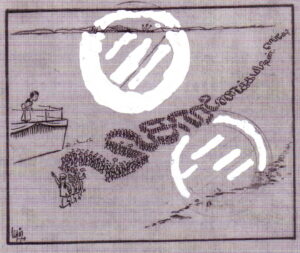
MGR leading demonstration for an Inquiry Commision, 1973
The second cartoon shows, Indira Gandhi in a platform looking down, and observing MGR leading a procession, which twists like a snake, with the question mark, ‘Where is the Commission of Inquiry?’
MGR claimed that it was he, and not Karunanidhi, who follows DMK’s founder leader Anna’s policies and principles. With all his mite, Karunanidhi attempted to blunt MGR’s accusations, by administratively taking steps to wean away public support to MGR via media. One such step was increasing the wall poster tax by five fold, when MGR’s ‘Ulagam Suttrum Valiban’ movie was released in May 1973. In those days, wall poster advertisements for newly released movies was a must. Movies were first released in Chennai, and distributors would evaluate the success of box office collections in other cities and towns, based on the reception received in Chennai. MGR decided to counter Karunanidhi’s strategy by opting to deviate from the prevailing practice. He stated, “We have to oppose this [tax increase]. No posters needed now. Let the printed posters be saved. There shouldn’t be any posters for this movie, or for my face. If this movie runs without such promotion, then it will be a novel trend itself.” The box office collections for ‘Ulagam Suttrum Valiban’ movie did ascertain MGR’s popularity among Tamil masses.
But, how much was MGR was able to achieve in pulling away MLAs from parent DMK party in quantitative terms? More than five months after, MGR formed his breakaway party, only 10 MLAs from the parent DMK party supported him. As of April 2, 1973, after the formation of Anna DMK party, the party positions at the Tamil Nadu Legislative Assembly were as follows:
DMK – 174, Congress (Old/ Organization) – 12, Anna DMK – 11, Communist Party of India (CPI) – 8, Forward Bloc – 7, Muslim League – 6, Swatantra Party – 6, Congress (Indira-leaning) – 6, Tamil Arasu Kazhagam -1, Independent – 1.
As ‘a stone to bring down two mangoes’
In Tamil, there is a popular idiom which says, ‘Oru kallil rendu mangai’ [using a stone to bring down two mangoes]. An attempt to use MGR as the stone to bring down two mangoes was a design of Indira Gandhi. Indirect evidence released in 1992 by police/intelligence officials representing the Central Government during that period indicates that MGR was subjected to (1) strong pressure to split MGR away from DMK; and subsequently (2) subtle pressure to merge his breakaway party with Indira Gandhi-led Congress. Based on how she had played politics in other three South Indian states (Andhra Pradesh, Karnataka and Kerala), that Indira Gandhi was incapable of such a deed cannot be denied. She successfully achieved her first objective; but failed in the second objective. Two motives could be attributed to Indira. First, to get even with Kamaraj and his Congress (Old) Party in Tamil Nadu. Second, to trim the flapping ‘state autonomy’ wings of Karunanidhi. But Indira Gandhi had become a seasoned pro in such courtship game, and so as not to spoil her fingers, she had delegated such task to her advisors/acolytes in the party – prominently Mohan Kumaramangalam (1916-1973), a Cabinet minister. In his autobiography, Karunanidhi had accused Kumaramangalam openly for such a foxy game, and projected MGR as a weak willed soul, to fall in such trap.
But fate decided otherwise. Mohan Kumaramangalam died in an Indian Airlines Flight of May 31, 1973. Had he lived, it’s an open question whether he could have persuaded MGR to merge his fledgling party with Indira’s Congress Party, akin to what had happened to E.V.K. Sampath’s (1926-1977) Tamil Nationalist Party of 1961.
Visit to Soviet Union in July 1973
MGR visited Soviet Union in July 1973, to attend the 8th Moscow International Film Festival (MIFF). How and why he received an invitation to attend this festival, is lost to history. He neither served in the jury for the selection of movie prizes for 1973 nor his movie was placed in the competition program. According to the brochure available in the net for MIFF in 1973, among the 15 who had served in the jury, few internationally recognized names of movie industry were George Stevens (USA – director), Toshiro Mifune (Japan – actor) and Gina Lollobrigida (Italy – actress). The only Indian film which was included in the Competition program was ‘Swayamvaram’ [literally, self choice of a male mate], a Malayalam movie directed by director Adoor Gopalakrishnan.
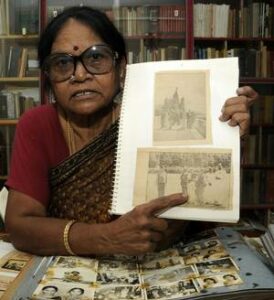
V.S. Kamala, Russian language interpreter to MGR in 1973
As MGR’s guiding hand in his first political action steps by M. Kalyanasundaram (1909-1988), a veteran MP, representing the Communist Party of India) in early 1970s, one may easily infer that the specific invitation for MGR to attend the MIFF was routed through the Communist Party channels in India.
A news item with a byline of Vivek Narayanan, that appeared in the Hindu of Sept.9, 2014, identified a lady V.S. Kamala (in her seventies) who had acted as a Russian language interpreter to MGR during his visit to Moscow. Then, she was a Russian language student. According to her memories, recorded by Narayanan,
“She recalled how curious locals surrounded MGR and asked various questions. ‘He wanted to answer everyone and asked me how to say ‘wait please’ in their language. [She taught him, ‘Podozhdite pozhaluysta – meaning ‘wait please’].
She was with MGR for a fortnight, teaching and interpreting the foreign language. ‘When I met MGR face to face at Hotel Russia, I was so enthralled that I could not even tell him my name when he asked,’ she says. Ms. Kamala also recalled her how MGR called her ‘annam itta kai’ (hands that fed) after she provided him with bread and sambar in the foreign land.”
According to the details provided in the memoirs of Ravindar (aka Kaja Mohideen), MGR’s writing assistant, MGR was treated well at the Russian hotel he had stayed. One of the hotel ladies had told him, that ‘You had come from the land of Raj Kapoor. That’s why, we treat you well, serving cow’s milk.’ MGR’s junior contemporary n Hindi movies, Raj Kapoor (1924-1988) had a big fan circle in Russia. In fact, Raj Kapoor did participate in the 4th MIFF, held in 1965, as one of the members of jury. After returning to India, MGR did communicate his thanks to Raj Kapoor., for the reception he had received in Russia. In reply, Raj Kapoor complimented MGR with the message: “You had mentioned that you are a fan of my father and became a rival to me. Due to this, my fan status had dipped to number 2 rank. Thank you. What you had written about my status in Russia isn’t that big. In fact, I was inquired about you, in Australia. Russia and Australia are in a far distance. It’s a continent as well.
Not only that, [like you] I’m an actor, director, producer and studio owner. But, you have one status and rank, which I don’t have. You are a leader of a political party. You know more than me – ‘A man who knew too much’.”
Visit to USA in Oct. – Nov. 1974
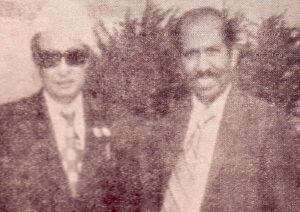
MGR with M.S. Uthayamurthy (in 1974)
Unlike MGR’s visit to Soviet Union, there exists a brief record of MGR’s visit to the USA in late 1974, in the form of an acquaintance script published by motivation author M. S. Uthayamurthy (1927-2013), the following year. As one who had earned a doctorate in chemical engineering in USA and being fluent in English, Uthayamurthy functioned as an interpreter to MGR during latter’s visit. Details presented below are based on his notes.
MGR had received invitations to deliver talks at their universities, from University of Wisconsin, Madison, University of Chicago, University of California, Berkeley, University of Pennsylvania and Columbia University. At the University of Wisconsin, MGR talked about the non-aligned policy of India. At this talk, he stated, “Before I left India, I had an hour meeting with Mrs. Indira Gandhi. She had asked me express her good wishes, wherever I talked. We have to respect each other mutually, and should not doubt others. Just because we differ from the policies of United States, that shouldn’t mean that we had sold ourselves to Russia. This belief, is erroneous.”
On Oct. 31, 1974, MGR delivered a talk on the topic, ‘The Anna DMK Party’s plans and programmes’, to the South Asian seminar series, at the University of Chicago. The audience were university faculty and students interested in South Asia studies.
At the University of California, Berkeley, MGR delivered a talk on the theme ‘Cinema – Influence of Drama and the Politics of Tamil Nadu’. In this talk, he described the contributions to social awareness by comedian N.S. Krishnan, political liberation songs of K.B. Sundarambal, dramas of Nawab Rajamanickam troupe as well as Anna scripted dramas ‘Velaikkari’ (Servant Maid) and ‘Sorga Vasal’ (Gate to Heaven). MGR also commented about his movie ‘Ulagam Suttrum Vaaliban’; ‘We show the flag of Anna DMK party, and introduce ourselves to the masses. We make them think about ourselves. If we have the use of TV like here (USA), we can do wonders.” During the question time, MGR’s responses to two questions were,
Question 1: ‘Why cinema actors were not involved in politics, in North India?’
MGR: ‘There have been actors who were politically involved in North India. They do collect funds during elections, and address political meetings. But, I think producers and script writers there were not involved with a long term view.’
Question 2: ‘Why you continue to act, without retiring?’
MGR: ‘I’m involved in a profession. If we open a shop, when customers to that place declines drastically, one need to close down. That’s the meaning. Still, people do support my movies; in large amount. Two of my movies are being released this month. (Note by Sachi: see below)That’s why I continue to act.’
According to Uthayamurthy’s notes, MGR’s speeches to the university audiences were in Tamil. But he shined during the question and answer sessions with the audience. He was keen in listening to the questions asked in English, and was particular in how the translator delivered his own answers without errors. Wherever he went, he was asked a variety of questions from the audience, mainly from ‘literate’ Indians who had moved to USA,. These ranged from public to personal or sublime to ridiculous, such as ‘Why your wife didn’t accompany you?’ Few delivered mini-talks to test the patience of MGR. But, MGR occasionally delivered knock-outs, with his simple common sense. A cited example of such an interaction at Philadelphia follows:
One irritating guy in the audience asked, ‘After living in America and had seen America, I suggest that wealth creation can occur only because of private industries. If you have doubts, shall we take a vote from the Tamil folks in Philadelphia?’ MGR delivered the rebuttal instantly: ‘Wait, wait. Those who should vote are the 45 million in Tamil Nadu. The verdict will become true, only then. The fate of Tamil Nadu should not be decided by the Tamils living here.’
The audience at the University of Pennsylvania asked challenging questions about the future of India. There, MGR criticized the movement initiated by Jayaprakash Narayan (1902-1979) in Bihar, when one questioner asked, ‘His demonstration in Bihar resembles that of yours in Tamil Nadu. What is your opinion?’ MGR’s vigorous response to this query was, “Jayaprakash had begun a movement to ‘refrain from paying taxes’. Gandhi also conducted such ‘refrain from paying taxes’ movement. But, he didn’t say, ‘Give the tax to me.’ Gandhi used his movement as an instrument to oppose the British. The policies of Jayaprakash are wrong indeed. Just because Jayaprakash belonged to Gandhian generation, he is being respected and given prominence. Otherwise, his agitation is meaningless.”
Few doubted that as a cinema actor who grew in delivering the scripts written by others, couldn’t speak well. Some doubted that there wouldn’t be depth in this thoughts. But, MGR proved all of them wrong. MGR also visited the Mount Senario College, a private non-profit college at north Wisconsin, and received a honorary doctorate. According to information in the net, this college established in 1930, was closed in 2002 due to poor financial management. As of now, I’m clueless about additional details related to who made the arrangement for MGR to receive a honorary doctorate from Mount Senario College in Wisconsin.
At the Waldorf-Astoria Hotel, New York, MGR met with Hollywood actor and Democratic political activist Gregory Peck (1916-2003) for 45 minutes. As many movie fans know, the career of Gregory Peck had professional parallels to that of MGR. As his obituarist William Grimes recorded in 2003, Peck often portrayed protagonists with ‘fiber’ within a moral setting. He was 8 months senior to MGR, and first became a stage actor in 1941, and moved into movies in 1944. Peck played active roles until 1978. But, unlike MGR, Peck did study at the university, being an alumnus of University of California, Berkeley.
Before their meeting, Gregory Peck had read the New York Times report by Bernard Weinraub, which appeared in Sept. 28, 1974. As such, he had asked MGR, ‘I read the write up about your activities in the New York Times. How are you able to achieve many things?’ MGR replied diplomatically: ‘The grace (blessings) of my mother still continues for me.” Peck followed through. ‘You did speak at the University of California. What do you think about the students there?’ MGR responded, “It’s more appropriate to say that I met with professors, rather than students. It’s because, they are so knowledgeable, even though still students.” Peck agreed, “True, true”.
On the two movies released in November 1974
Sridhar’s ‘Urimai Kural [Voice of Rights]’ and S.S. Balan’s ‘Sirithu Vazha Vendum[Live with a Smile]’ were the two movies that were released in November 1974, which MGR mentioned in an answer to a question asked at the University of California, Berkeley. About Sridhar’s first movie with MGR, I had covered in the previous chapter [https://sangam.org/mgr-remembered-part-60/]. Still, I have two more episodes to cover, from Sridhar’s specific observations related to MGR’s preferences before camera.
First relates to camera angle. Sridhar states, “I had signed Balakrishnan as the cameraman. As he was occupied with another movie’s final scenes, as a temporary arrangement, he had asked Thampu to cover for him. What Thampu conveyed to me, was a like a ‘bomb’ to me. He said, ‘Sir, MGR prefers to take many close up shots at direct angle. He don’t like the preferences of ‘top angle’ and ‘low angle’ of directors. You are a low angle specialist? Don’t you think, there may be a problem here?
As I haven’t known about this particular issue, I was really surprised. Still, I thought of convincing MGR, with the famed Ekalaivan story from Mahabharata epic. Finally, I asked him the question, ‘What do you think about the situation faced by Ekalaivan, who had donated his thumb to his Guru Drona Achary?’ MGR didn’t answer my query, then with a smile quipped, ‘Why this story of Ekalaivan here? Tell [me] the reason.’ I replied. ‘If you prohibit me for any low angle shots, I’ll be forced to the Ekalaivan situation.’ Then, MGR’s smile turned into a hearty laughter. ‘Bale, You are a shrewd guy indeed! You have my full permission to use camera in any angle. Why? You don’t even have to show my face. I don’t mind, if you focus my back alone.’ I gripped his fingers and with expressed my thanks with fumbling words for his graciousness.”
The second episode relates to how MGR opts to shoot the fighting scenes. According to Sridhar, “As much as possible, in fighting scenes, MGR acts without any dupe. Occasionally, if a situation arise that a dupe is needed, he adopts a strict policy. This is a good example of how he wished to maintain his image carefully. First, he requests to shoot the fighting scenes in which he appear. Then, he fixes a date for his dupe to complete the sequences. On that particular day, he wouldn’t turn up for shooting. His policy was that, no one should see him and his dupe in the same set.
After the shooting, MGR willingly arrives at the editing room. Then, he will combine his fighting scenes and that of dupe’s spectacularly. He would edit the scenes with skill so that what we see in the screen shines well. To the Urimai Kural movie, he did edit the fighting scenes and contributed to the success of it.”
Now, a little bit to the background of ‘Sirithu Vazha Vendum’, from the notes of Ravindar. It was a Tamil re-make of the 1973 Hindi hit movie of Zanjeer [Shackles], starring Amitabh Bachchan, Jaya Bachchan and Pran. MGR was attracted to the Muslim character role played by Pran. A lyric of Pulamaipithan, ‘Ennathil nalam irunthal inbame ellorkum; Anbulla tholarkale Aslam allaikum, Onre solvan nanre seivan’ [If the thoughts are virtuous, everyone will be happy; Dear friends, Aslam Allaikum. [He] tells only one thing, and do the same thing] sung by T.M. Soundararajan for which MGR lipsynch for this Muslim character was included as a propaganda song for his Anna DMK party. The Youtube link for this song is https://www.youtube.com/watch?v=p1UVWAn1G80
It was obvious, MGR was angling for the Muslim vote in Tamil Nadu. But, in fact, a sizeable percent of Muslims were his fans. In addition to this Muslim character, MGR also played the police inspector role of Amitabh Bachchan, in the Hindi original.
Srinivasan Balasubramanian (aka S.S. Balan, 1935-2014) is the son of pioneer Tamil journalist and movie mogul Subramaniam Srinivasan (aka S.S. Vasan, 1904-1969) of Gemini Studios. One of the grand hits made by Gemini banner was ‘Chandralekha’ (1948), when MGR was ascending the ladder of fame. MGR had specifically chosen S.S. Balan as the director for ‘Sirithu Vazha Vendum’, to be produced by journalist S.V.S. Manian, for two reasons. Reason 1: “After watching Chandralekha, I had
yearned to play a role in a movie directed by Vasan. At last, a chance came. It was Oli Vilakku [which was promoted as MGR’s 100th movie]. But, Vasan didn’t direct it. He nominated Chanakya. I asked the reason from him. He said, ‘ To direct you, I need to learn some more. I have been planning to re-make ‘Apoorva Sagothararkal’, in a big budget, like Chandralekha, and direct it myself. But, I was unlucky. [Vasan had died in 1969]. As such, for this movie, I wish to create a double role for me, and make his son to direct me. It’s an honor for me that I’m in a position to ask the son to do it, which I had expected from his father. Reason 2: Producer Manian grew up in Gemini stable [as a journalist of Ananda Vikatan]. It’s also a gratitude for him to give work to his ex-boss’s son.
Cited Sources
Chandramouli : Thirumpi Parkiren – Director Sridhar, Arunthathi Nilayam, Chennai, 2002, pp. 332-337. (in Tamil)..
William Grimes: Gregory Peck, a star of Quiet Dignity, dies at 87. New York Times, June 13, 2003. Gregory Peck, a Star of Quiet Dignity, Dies at 87 – The New York Times (nytimes.com)
Kannan: MGR – A Life, Penguin Random House, India, Gurgaon, Haryana, 2017.
Karunanidhi: Nenjukku Neethi autobiography, vol.1, Thirumagal Nilayam, Chennai, 1987, pp. 99-100. (in Tamil).
Narayanan V. An act of interpretation in Soviet Russia. The Hindu, Sept. 9, 2014.
An act of interpretation in Soviet Russia – The Hindu
A.S.Panneerselvan: Karunanidhi – A Life, Penguin Random House India, Gurgaon, Haryana, 2021, p. 216.
Ravindar: Pon Mana Chemmal MGR, Vijaya Publications, Chennai, 2009, pp. 108-109, 118-119, 124-125. (in Tamil).
Special Correspondent: Tamil writer M.S. Udayamurthy passes away. The Hindu, Jan. 21, 2013. Tamil writer M.S. Udayamurthy passes away – The Hindu
Dr. M.S. Udayamurthy: Americavil Anna – MGR, Vivwan Pathippagam, Chennai, 1975, pp. 59-107. (in Tamil).
Even though I am an ardent fan of MGR, and read a lot about him over the years, Dr. Sachi continues to surprise me with new information about MGR. It is a well known fact that food always played a major role in his psyche and he takes great pleasure in providing food to his guests and pioneered free nutritious meal program for children. By the same token, when a lady provides him food in a strange land of Russia, he used emotional language of ‘Annamitta Kai’ (hand which fed me).
The details of his American trip are amazing. In particular, the finesse with which he handles the question about private industries is unbeatable. I still remember how he beat wily Karuna’s act of ‘poster tax’ and it is a pleasure to read about it again. This episode is really a wealth of information in particular very rare incidents like his interactions with Raj Kapoor and Gregory Peck.